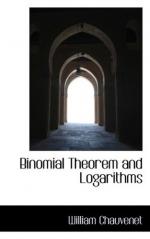|
This section contains 250 words (approx. 1 page at 300 words per page) |
The binomial theorem is a statement of the result obtained by multiplying a binomial by itself any given number of times. Beginning algebra students are familiar with this theorem when multiplying two binomial terms:
(a + b) 2 = a2 + 2ab + b2.The binomial theorem extends this case to n terms:
(a + b) n = an + c1an-1b + c2an-2b2 + c3an-3b 3 +... + cran-rbr +... + bn
The binomial theorem for positive integer exponents was known by the Arabs of the thirteenth century. The theorem was generalized to fractional and negative exponents by Isaac Newton in 1664 or 1665, but his results were not actually published until 1711. In these cases the expansion is in terms of an infinite series, a result that Newton described in a June 13, 1676, letter to the Royal Society.
Some credit for the early development of the binomial theorem for fractional powers should also go to the Scottish mathematician James Gregory (1638-1675). Gregory apparently developed the theorem shortly after Newton (about 1670) without knowing of the Englishman's work.
A precise statement of the binomial theorem was provided by the Norwegian mathematician Niels Henrik Abel. In 1826, Abel wrote a famous letter to a colleague in which he noted that "there is in all of mathematics not a single infinite series whose sum has been stringently determined." He applied himself to this task and soon obtained that result for the series used in the binomial theorem. Credit for extending Newton's original work to its present day form must go, therefore, to Abel.
|
This section contains 250 words (approx. 1 page at 300 words per page) |


